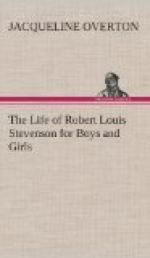How any good result could come from all this neither his father nor mother could see, and with the loss of their sympathy he was thrown upon himself and was lonely and rebellious.
He longed to get away from it all, to quit Edinburgh with its harsh climate, and often on his walks he leaned over the great bridge that joins the New Town with the Old “and watched the trains smoking out from under, and vanishing into the tunnel on a voyage to brighter skies.” He longed to go with them “to that Somewhere-else of the imagination where all troubles are supposed to end.”
It was a comfort to him at this time to remember other Scotchmen, Jeffries, Burns, Fergusson, Scott, Carlyle, and others, who had roamed these same streets before him, not a few of them fighting with the same problems he faced in their struggle to win their ideal.
This unhappy time, this “Greensickness,” as he called it, came to an end, however, through the help of what Louis had always secretly longed for—friends. Several whom he met at this time influenced him, but first of them all he put his cousin Robert Alan Mowbray Stevenson (Bob), who returned to Edinburgh about this time from Paris, where he had been studying art.
Louis says: “The mere return of Bob changed at once and forever the course of my life; I can give you an idea of my relief only by saying that I was at last able to breathe.... I was done with the sullens for good.... I had got a friend to laugh with.”
Here at last was a companion who understood him and sympathized with what he was trying to do. Since as children they had made believe together in their rival kingdoms of “Nosingtonia” and “Encyclopaedia” they had had many traits and tastes in common. They now began where they had left off and proceeded to enjoy themselves once more by all sorts of wild pranks and gay expeditions.
The Speculative Society became another great source of pleasure. It was an old society and had numbered among its members such men of note as Scott, Jeffrey, Robert Emmet, and others. Once a week from November to March the “Spec,” as it was called, met in rooms in the University of Edinburgh. An essay was read and debates followed with much hot discussion, which delighted Stevenson. “Oh, I do think the Spec is about the best thing in Edinburgh,” he said enthusiastically.
Sir Walter Simpson, son of the famous doctor, Sir James Simpson, who discovered chloroform, became another chum about this time, and for the next ten years they were much together. He likewise was studying law and was a near neighbor. The Simpsons kept open house, and it was the custom for a group of cronies to drop in at all hours of day and night. Louis was among those who came oftenest, and Sir Walter’s sister writes: “He would frequently drop in to dinner with us, and of an evening he had the run of the smoking room. After ten p.m. the ‘open sesame’ to our door was a rattle on the letter box and Louis’ fancy for the mysterious was whetted by this admittance by secret sign, and we liked his special rat-a-tat for it was the forerunner of an hour or two of talk.”




